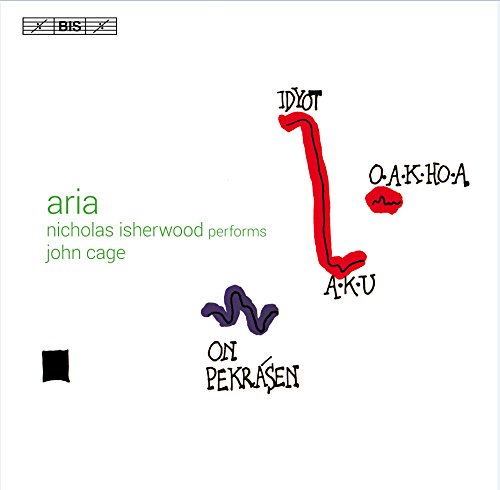CAGE Aria. Ryoanji
View record and artist detailsRecord and Artist Details
Composer or Director: John Cage
Genre:
Vocal
Label: BIS
Magazine Review Date: 08/2015
Media Format: Super Audio CD
Media Runtime: 44
Mastering:
DDD
Catalogue Number: BIS2149

Tracks:
| Composition | Artist Credit |
|---|---|
| Aria |
John Cage, Composer
John Cage, Composer Nicholas Isherwood, Bass-baritone |
| A Chant with Claps |
John Cage, Composer
John Cage, Composer Nicholas Isherwood, Bass-baritone |
| Sonnekus |
John Cage, Composer
John Cage, Composer Nicholas Isherwood, Bass-baritone |
| Eight Whiskus |
John Cage, Composer
John Cage, Composer Nicholas Isherwood, Bass-baritone |
| (A) Flower |
John Cage, Composer
John Cage, Composer Nicholas Isherwood, Bass-baritone |
| (The) Wonderful widow of eighteen springs |
John Cage, Composer
John Cage, Composer Nicholas Isherwood, Bass-baritone |
| Nowth upon Nacht |
John Cage, Composer
John Cage, Composer Nicholas Isherwood, Bass-baritone |
| Experiences II |
John Cage, Composer
John Cage, Composer Nicholas Isherwood, Bass-baritone |
| Ryoanji |
John Cage, Composer
John Cage, Composer Nicholas Isherwood, Bass-baritone |
Author: Philip Clark
And here you’ll notice that the bass-baritone Nicholas Isherwood is billed as ‘performing’ rather than ‘singing’ Cage. Isherwood’s reverberant voice, rich like steamed lobster flesh, lends a wholly unexpected flavour to early-period Cage songs: existing performances of ‘The Wonderful Widow of Eighteen Springs’ (1942) and ‘A Flower’ (1950) from Joëlle Léandre, Joan La Barbara and Arline Carmen (with Cage on piano) have no point of connection with operatic pomp.
But if you suspect this disc is about to suffer a critical drubbing on the grounds of stylistic impurity, fear not: Isherwood is far too wise and sensitive to misrepresent Cage. His new disc is an eloquent and persuasive contribution to the Cageian cause precisely because he approaches the music from an alternative vantage point, and Cage’s material proves itself robust enough to cope.
And thrive too. Isherwood’s realisation of Ryoanji, Cage’s mid-’80s self-assembly score for voice and variable ensemble, purées the instrumental accompaniment down to fingers divining pure-toned pitches from the rim of a water-filled crystal wine glass. A glorious three-part invention ensues: the resonant harmonics of the wine glass cut through real-time Isherwood dubbed over his own pre-recorded voice, the overlapping lines at times smudging towards randomised sonic smog. Cage would surely have approved.
Isherwood’s vocal acrobatics take us far deeper inside melodic nuance than any other performance; tiptoeing gradations of microtonal pitch, glissandos suspended mid-freefall, errant notes grabbed from nowhere made to find their context. The disc launches with a hybrid performance of the vocal Aria combined with the electronic Fontana Mix (both 1958), which Isherwood stages as vivid living theatre. ‘Nowth Upon Nacht’ (1984) represents Cage at his most expressionistic: a shriek of falsetto despair in memory of Cathy Berberian.
Discover the world's largest classical music catalogue with Presto Music.

Gramophone Digital Club
- Digital Edition
- Digital Archive
- Reviews Database
- Full website access
From £8.75 / month
Subscribe
Gramophone Full Club
- Print Edition
- Digital Edition
- Digital Archive
- Reviews Database
- Full website access
From £11.00 / month
Subscribe
If you are a library, university or other organisation that would be interested in an institutional subscription to Gramophone please click here for further information.




